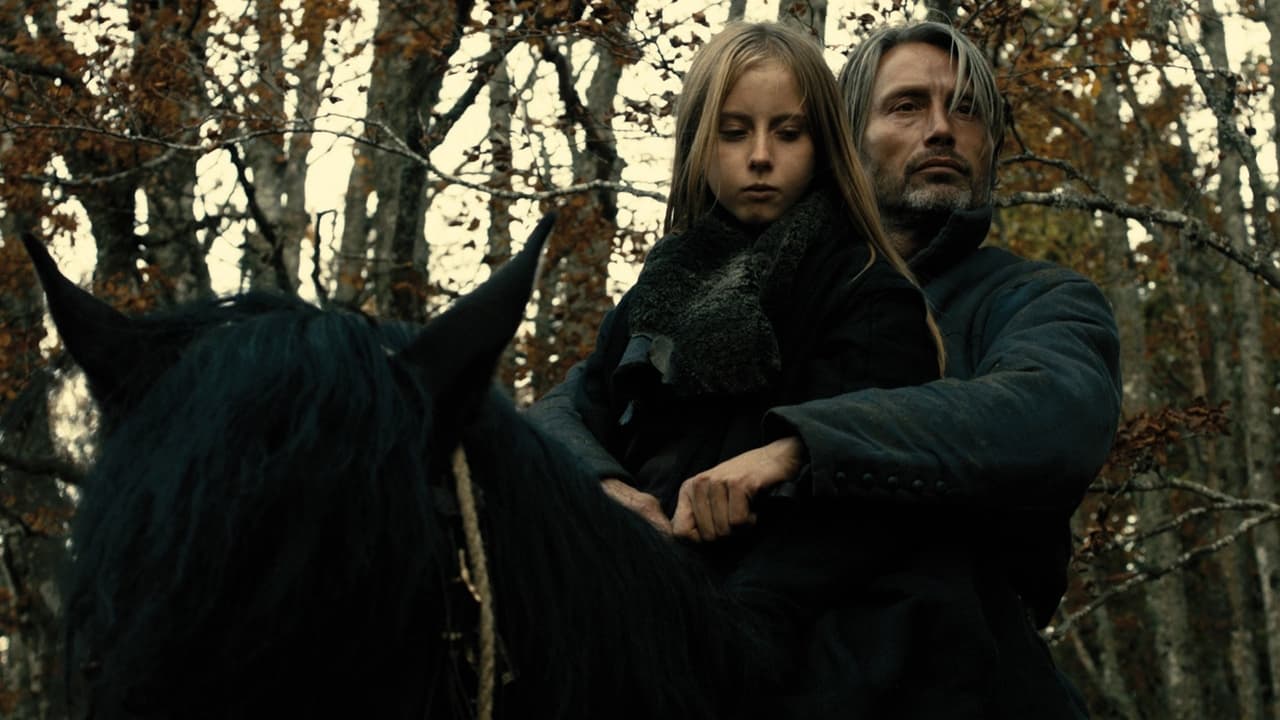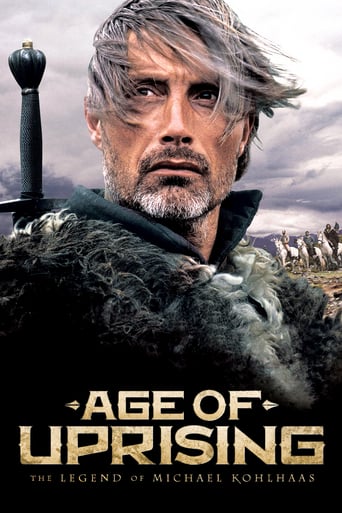

Highly Overrated But Still Good
... View MoreA brilliant film that helped define a genre
... View MoreThere is just so much movie here. For some it may be too much. But in the same secretly sarcastic way most telemarketers say the phrase, the title of this one is particularly apt.
... View MoreThis is one of the best movies I’ve seen in a very long time. You have to go and see this on the big screen.
... View Morelike a clock. precision, strange beauty, delicate mechanism. the acting, the landscape, the script. as pillars of an admirable work who remains the novel by Kleist but it has the gift to be more than an inspired adaptation. a film about justice and sin. and a splendid role for Mads Mikkelsen who gives to his character not only the traits of the novel but something special, powerful, entire convincing. the grace to use the nuances of Michael Kohlhaas, the wise manner to use the silences, the force of gestures, the beautiful measure who discover the essence of tragedy, the presence of Roxane Duran who reminds, in same measure, Elisabeth I and the young Elisabeth II, the performance of Melusine Mayance, the speech of Denis Levant who remains the perfect definition of the root of tragedy are the details who transforms an adaptation in useful support for reflection about great themes.
... View MoreThis movie is all about the question of justice, morals, and ethics within the context of choices. Kohlhaas had many options open to him, all of which were pointed out by different people.He was a prosperous man who could afford to lose 2 horses, yet he chose to believe that the impartiality of the court system must prevail. Influence and wealth had no place in Kohlhaas's world.He chose, along with his wife, to believe that negotiation was also an option and instead she found death.Even in his crusade for justice, he chose to murder one of this own men (who had stolen from villagers) to reinforce that ethics must still prevail in war.Kohlhaas was a deeply tortured soul who loved his family, his land, cared for his servants and was passionate about his horses. This is not a man who wanted to go to war willingly.Yet when directly confronted with the wrongs of this world, his soul could not rest. The ultimate irony is that in the end justice did prevail, however the means to that end required Kohlhaas pay with his life from the very hands of those who gave him justice.One must not forget the underlying political theme. This is during a time when institutions were a work in progress and if one man could attract a motley band of peasants and ex-soldiers for a personal crusade who else may come along and threaten the power base of the political elite.Justice had no choice but to been seen to prevail. Yet Kohlhaas had to die for his insolence of inciting fear of revolt against those who ruled the lands.Kohlhaas's story did not die with him and why it still remains popular today.The Director, Anders Thomas Jensen makes his audience work hard in this movie and it helped to do some historical research before watching it.This is a fabulous movie, raw and authentic.
... View MoreSome people might not feel comfortable with this film, which is not surprising. It does move with a very slow pace and it is a movie about values. The question is, do you want a movie that might feel like a lecture to you? It isn't of course, but I would understand if some viewers would feel like that.Mads is playing as strong as ever and the character is complicated, but has a strong sense of righteousness. Something that has been the downfall for many people. And standing up for yourself or others is not that easy. It's easier to just back down and take it, than to stand up and fight. But is it worth it? There are quite a few questions that you might ask yourself after watching this movie, because it does not answer everything for you ...
... View MoreFormerly a documentary maker, with one feature ADIEU under his belt, Arnaud des Pallières has obviously taken to heart the description of Von Kleist's 1810 novella as surprisingly modern in theme (a fanatical quest for justice) and style (existentialist detachment posing as a chronicle). Having nailed himself to the mast on these two principles as director and writer Pallières consequently has nowhere to go. The plot, transposed to France rather than Brandenburg, is still set in the 16th Century, and it follows Kleist's novella closely. The fanatical quest for justice is absolutely there but Kleist wrote MICHAEL KOHLHAAS as a novella. Pallières inflates it into a 122 minute film (feels longer) - not kind to Kleist or his actors, especially Mads Mikkelsen, who does all the heavy lifting. The emphasis on Kohlhaas as one of these new-fangled Protestants reading the Bible in the vernacular contributes to our understanding that this man is an outsider and a rebel in his heart. His isolated living conditions contribute to the sense of an outsider. His misreading of the power structure when he first tries to get justice through the courts and again when he orders his followers home again show him to be the outsider – all these things are in the book and in the film. The film lacks dramatic suspense – you are in no doubt what will happen from the opening confrontation with the Baron's men - and only becomes more tedious as we labour towards the conclusion. We crave suspense, light and shade and emotional variations. We don't get them. Many sequences in this film had beginnings and middles but no endings, for example where Kohlhaas and his wife are in bed together and the child comes in and tells them they are making a noise. Right, okay, so then... Some scenes are unnecessary, for instance, where Kohlhaas' adherents are seen learning the hard way that they mustn't loot. Much later Kohlhaas delivers a speech (important in the context of the nature of his revolt against authority) - his followers mustn't steal and mustn't take gifts but must pay for everything they take. Surely one of these two sequences is repetitive and weren't they out of order? In the attack on the Baron's stronghold, I was left very confused about the outcome for the woman and her crying baby. There were a lot of cross bows and arrows flying about. Does Kohlhaas accept killing everyone there or not? There are peculiar lapses in the script – Kohlhaas talks more than once about his children but we only meet the daughter so where are the others? Are his sons with him in the revolt? Apparently not. And who is Jérémie – nephew or neighbour? Existential detachment posing as a chronicle is not a natural fit for narrative cinema, for good reason. As a documentary maker Pallières knows how to make something out of the material available to him but as a narrative film-maker he has refused to shape his story, sticking to his existential detachment etc above. Unfortunately, he isn't Bergman or Brecht. The camera frames tightly on each character but there is never a sense of life going on outside the frame. In this world of people and horses the little daughter seems totally isolated. No other animals exist – where are the chickens, the sheep, the odd cat or mouse on this farm? Pallières is keen on big wide pans – unfortunately they don't give you much to read – men and horses, horses and men, occasionally a wagon. The opening with the long shot on the ridge against a brooding sky of the men leading their horses to market, introducing Michael Kohlhaas and his world, was striking. I accepted the low available light, slightly off-key sight lines, and lack of precision where we were in the set up. After all, we are post-Dogme now. But Pallières' refusal to give us a sense of life beyond the edges of each frame soon made the film airless, relying too much on Mads Mikkelsens' subtle face to keep us emotionally involved. The other actors seemed happy to convey little with their faces – but I sense he and Bruno Ganz who smuggled in a few twitches of the mouth were struggling. And it implies that the director cast for faces rather than performance qualifications. There were some sequences to enjoy – Michael Kohlhaas' dirty bare feet as he walked about the farm; unrolling the bolt of fabric to reveal the dress for his wife after his successful sale of the horses; and the attack by the rebels on the convoy supposedly taking the Baron away, shot from up high on a hill top and watched with detachment. But in the scene where the mother's body is returned home and the little daughter runs and runs and runs it would normally carry a weight of emotion – fear, suspense, horror – but here it's just a lot of running. The editing is chaotic, the flow fractured, and we never know where we are in the story. If this is the fruit of existentialist detachment give me old-fashioned narrative. In judgement – I think the film long, confused and emotionally neutered – but faithful in intent to the novella. But why should books and films be a pure reflection of the other? Maybe Pallières is saying that anyone who isn't familiar with the novella isn't worth the trouble of an explanation about anyone or anything that happens. If he is holding two fingers up to most of his potential audience it's not much of a career move. And he has certainly queered the pitch for the next enterprising but unknown filmmaker who wants Mads Mikkelsen to come work with him. I look forward to Mads Mikkelsens' THE SALVATION for his own take on man against the powers that be. It will be interesting.
... View More